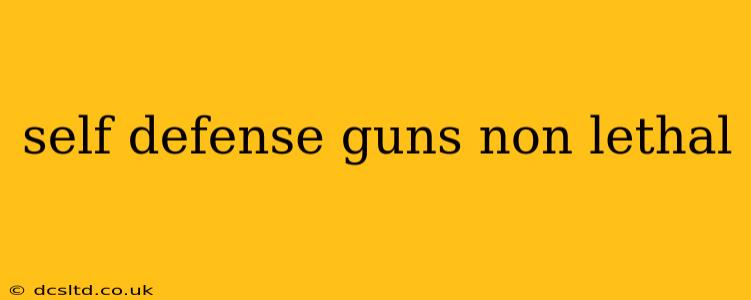Personal safety is paramount, and the desire to protect oneself and loved ones is a fundamental human instinct. While lethal firearms offer a powerful means of self-defense, many individuals seek non-lethal alternatives. This article explores various non-lethal self-defense tools categorized as "guns," examining their effectiveness, limitations, and legal considerations. It's crucial to remember that no self-defense tool guarantees complete safety, and responsible use and legal understanding are paramount.
What are Non-Lethal Self-Defense Guns?
"Non-lethal self-defense guns" typically refer to weapons designed to incapacitate an attacker without causing death. However, it's vital to understand that even non-lethal weapons can inflict serious injury or even death under certain circumstances. These tools aim to create a temporary disabling effect, allowing you to escape or call for help. They differ significantly from firearms that use projectiles.
Types of Non-Lethal "Guns":
-
Pepper Spray Guns: These devices propel a concentrated stream of oleoresin capsicum (OC), the active ingredient in pepper spray, over a greater distance than standard pepper spray cans. This offers a tactical advantage, allowing for engagement from a safer distance.
-
Stun Guns: Often called tasers (although "taser" is a brand name), these weapons use electrical discharges to temporarily incapacitate an attacker by causing muscle spasms and pain. They are effective at close range.
-
Air Soft Guns: While generally considered toys, some powerful airsoft guns can deliver a painful impact, potentially causing temporary incapacitation. However, their effectiveness as a reliable self-defense tool is debated due to inconsistencies in projectile impact and the potential for escalation. Legal restrictions vary significantly by location.
-
Paintball Guns: Similar to airsoft guns, paintball guns use paint-filled projectiles to mark and deter attackers. Their effectiveness as a self-defense weapon is limited, mainly suitable for deterring rather than incapacitating.
Are Non-Lethal Guns Effective for Self-Defense?
The effectiveness of non-lethal self-defense tools depends heavily on several factors, including:
-
Distance: Pepper spray guns have an advantage here, offering greater range than other options. Stun guns and other close-range weapons require proximity to the attacker.
-
Target's Physical and Mental State: The effectiveness of any self-defense weapon will be influenced by the attacker's physical condition, drug or alcohol use, and overall state of mind.
-
User's Training and Proficiency: Proper training and practice are crucial for effective deployment. Improper use can lead to ineffective results or even injury to the user.
-
Legal Ramifications: The legal consequences of using a non-lethal self-defense weapon can be significant and vary widely depending on local laws, the circumstances of the incident, and the actions of both parties involved.
What are the Limitations of Non-Lethal Self-Defense Weapons?
-
Range: Many non-lethal weapons have limited range, requiring the defender to get uncomfortably close to the attacker.
-
Malfunction: Like any tool, these devices can malfunction, leaving the user vulnerable.
-
Ineffectiveness Against Certain Threats: Against multiple attackers or individuals under the influence of drugs or alcohol, non-lethal weapons may prove inadequate.
-
Legal Considerations: The legal repercussions of using a self-defense weapon, even a non-lethal one, can be severe. It's critical to understand your local laws before carrying or using any such tool.
What are the Legal Aspects of Using Non-Lethal Self-Defense Weapons?
Laws regarding the carrying and use of non-lethal self-defense weapons vary significantly by jurisdiction. It is absolutely essential to understand and comply with local, state, and federal regulations. Factors like age restrictions, licensing requirements, permitted carry locations, and the legal justification for use must be thoroughly researched and understood. Ignorance of the law is not a defense.
How to Choose the Right Non-Lethal Self-Defense Weapon?
The best choice depends on individual circumstances, physical capabilities, and legal considerations. Factors to consider include:
-
Range: How far away will you need to engage a threat?
-
Ease of Use: Can you quickly and effectively use the weapon under stress?
-
Legality: Is the weapon legal to possess and carry in your area?
-
Training: Is training available and affordable?
-
Personal Preferences: What feels most comfortable and confident to you?
Disclaimer: This information is for educational purposes only and should not be considered legal or professional advice. Always consult with legal professionals and law enforcement agencies to ensure compliance with all applicable laws and regulations regarding self-defense and the use of non-lethal weapons.
